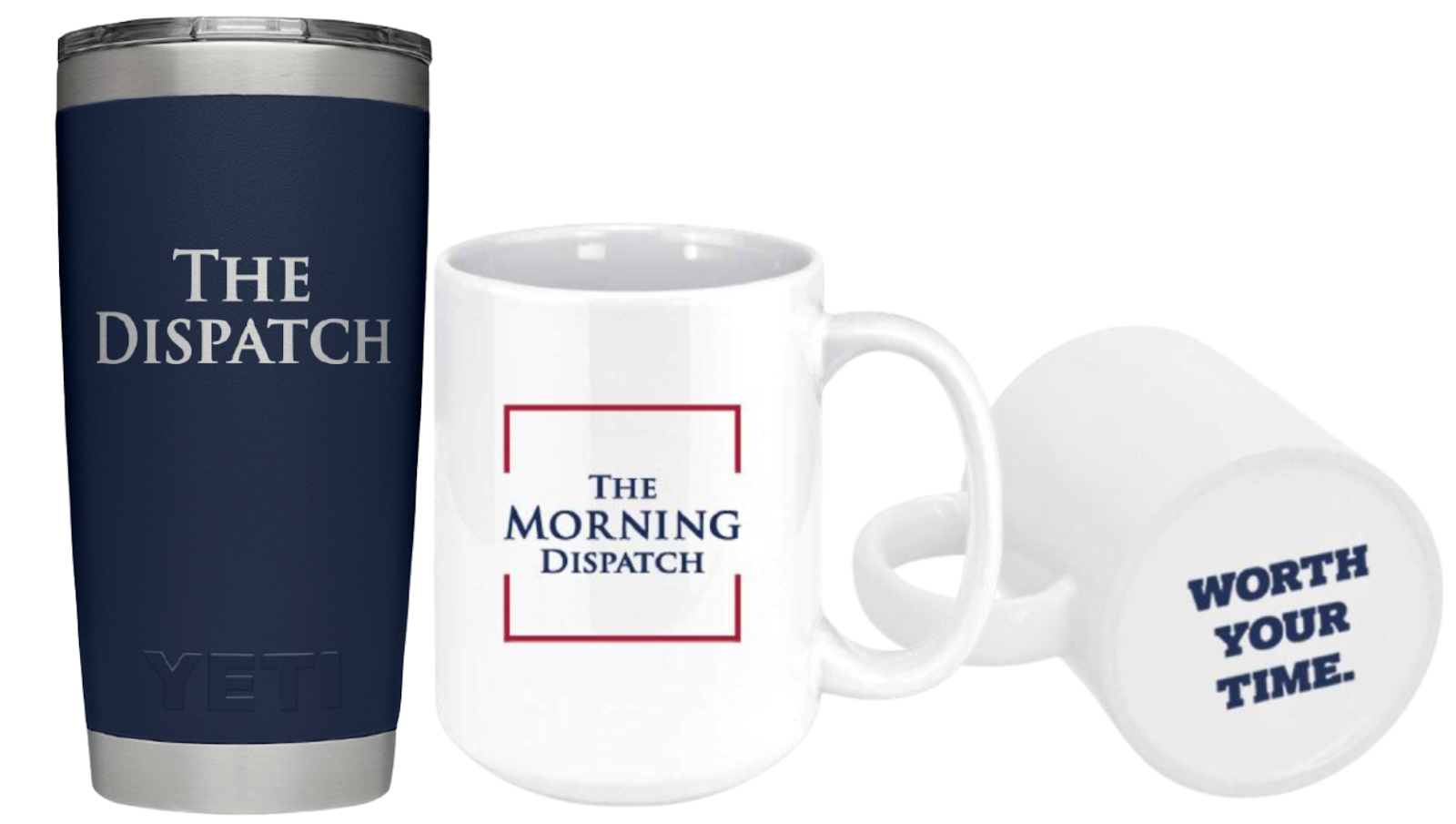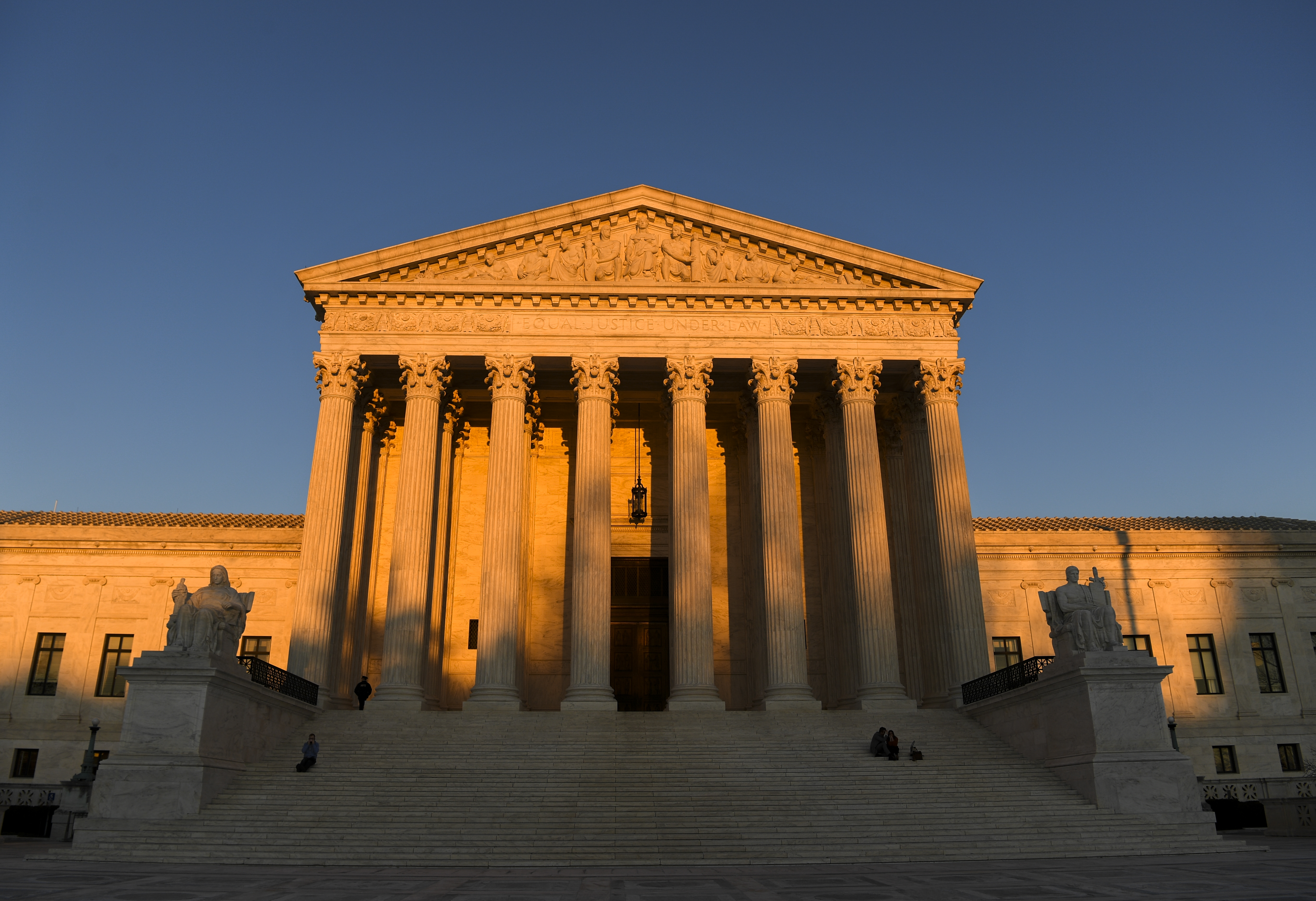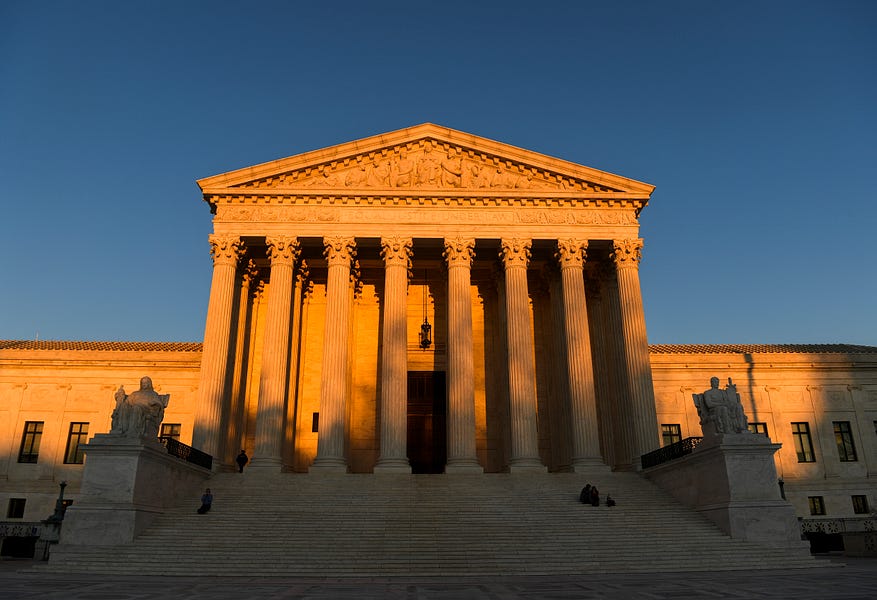Happy Tuesday! For those of you who enjoy this newsletter, we have excellent news: You can now enjoy it in Yeti and/or mug form! Check out the latest additions to the Dispatch Merch Store, and do it fast—we’ve got a limited supply (particularly of the Yetis, for now).

Quick Hits: Today’s Top Stories
-
In a unanimous decision released Monday, the Supreme Court upheld a lower court’s ruling that the National Collegiate Athletic Association violated antitrust laws by restricting college athletes’ ability to earn education-related benefits.
-
Organizers of next month’s Olympic Games in Tokyo announced Monday that each sporting venue will be allowed to open to 50 percent capacity, with a maximum of 10,000 fans—Japanese residents only—per venue.
-
The Biden administration on Monday announced its allocation plan for the final 55 million of the 80 million COVID-19 vaccine doses the United States pledged to export around the globe by the end of June. Approximately 41 million of the doses will be distributed to Latin America, Asia, and Africa through the WHO’s COVAX initiative.
-
The United States, United Kingdom, and European Union imposed new sanctions on Belarusian officials and entities on Monday, reflecting increasing Western resolve toward the Lukashenko regime.
-
Apple Daily, a pro-democracy newspaper in Hong Kong unrelated to the tech company, is likely to cease operations on Friday under pressure from the Chinese government. With millions of dollars of its assets frozen and some of its executives arrested for violating a new Chinese national security law, the company that publishes the newspaper has set Friday as a deadline to decide whether to close.
-
The United States confirmed 12,430 new cases of COVID-19 yesterday per the Johns Hopkins University COVID-19 Dashboard, with 3.34 percent of the 371,877 tests reported coming back positive. An additional 266 deaths were attributed to the virus on Monday, bringing the pandemic’s American death toll to 602,092. According to the Centers for Disease Control, 12,179 Americans are currently hospitalized with COVID-19. Meanwhile, 610,033 COVID-19 vaccine doses were administered yesterday, with 177,342,954 Americans having now received at least one dose.

NCAA Takes the L
Less than one week removed from its Obamacare and Fulton County decisions, the Supreme Court on Monday handed down another consequential ruling in National Collegiate Athletics Association v. Alston regarding education-related compensation for college athletes. In a unanimous decision written by Justice Neil Gorsuch, the court ruled that the NCAA’s characterization of its programs as amateur athletics did not justify limiting education-related benefits for student athletes.
In his 35-page ruling, Justice Gorsuch dove into the history of collegiate athletics before getting to the specifics of the current case. “From the start, American colleges and universities have had a complicated relationship with sports and money,” he wrote.

During oral arguments in March, the NCAA argued that a 1984 Supreme Court decision—NCAA v. Board of Regents of the University of Oklahoma—gave it the power to set limits on student-athlete compensation and to shield those limits from meaningful review. But Gorsuch disagreed.
“Board of Regents may suggest that courts should take care when assessing the NCAA’s restraints on student-athlete compensation,” he wrote. “But these remarks do not suggest that courts must reflexively reject all challenges to the NCAA’s compensation restrictions.”
College sports generate billions of dollars every year, and have boosted the coffers of universities across the country, as well as the NCAA itself. But these earnings do not, Gorsuch noted, reach the students themselves.
The Supreme Court upheld an earlier ruling from a California district court judge that claimed the NCAA was violating antitrust law with its limits on education-related benefits for college athletes. However, it did not take a position on a broader question about the legality of NCAA restrictions on other types of compensation.
For its part, the NCAA claimed that the ruling “[reaffirmed its] authority to adopt reasonable rules and … to articulate what are and are not truly educational benefits.” But the court’s relatively narrow ruling yesterday may have much broader implications for college athletics in the future. Justice Brett Kavanaugh offered a concurrence that sharply criticized the NCAA for its practices.
“Nowhere else in America can businesses get away with agreeing not to pay their workers a fair market rate on the theory that their product is defined by not paying their workers a fair market rate,” Kavanaugh wrote. “And under ordinary principles of antitrust law, it is not evident why college sports should be any different. The NCAA is not above the law.”
In his opinion, Kavanaugh compared NCAA athletes to workers in other industries, suggesting that the NCAA was not justified in its attempts to categorize college sports as a special category of labor.
“All of the restaurants in a region cannot come together to cut cooks’ wages on the theory that ‘customers prefer’ to eat food from low-paid cooks. Law firms cannot conspire to cabin lawyers’ salaries in the name of providing legal services out of a ‘love of the law.’ Hospitals cannot agree to cap nurses’ income in order to create a ‘purer’ form of helping the sick. News organizations cannot join forces to curtail pay to reporters to preserve a ‘tradition’ of public-minded journalism. Movie studios cannot collude to slash benefits to camera crews to kindle a ‘spirit of amateurism’ in Hollywood. Price-fixing labor is price-fixing labor.”
Yesterday’s ruling sets up the NCAA to face much broader legal challenges to its restrictions on student-athlete compensation. “The floodgates are now open to an array of claims from student-athletes,” University of Texas law professor Steve Vladeck told CNN. “The NCAA’s amateurism-centric business model is likely to face far larger and more wide-ranging challenges in the near future.”
Steve Berman—a co-counsel in the Alston case who is already leading a lawsuit against NCAA limits on college athletes’ ability to profit from their name and likeness—offered a similar assessment.“In light of Justice Kavanaugh’s comments,” he said, “we’re rethinking whether we should once again challenge pay for play. Kavanaugh is suggesting you should go after everything.”
Despite Coronavirus Concerns, Olympics to Allow Domestic Fans
With the 2021 Olympics set to kick off a month from tomorrow, the top athletes from around the globe are gearing up to head to Tokyo. (Congratulations to Olivia Smoliga—a high school classmate of one of your Morning Dispatchers—who recently qualified for her second straight Olympic berth!)
But with the games’ start date growing nearer, the reason they are even being held this year still looms large. As Tripp Grebe noted in a piece for the website earlier this month, concerns that the Olympics will lead to another COVID-19 wave in Japan have instigated wide-scale domestic protests. Confirmed new COVID-19 cases and deaths are both declining precipitously in Japan right now, but according to Our World in Data, just 17.8 percent of Japan’s population had received at least one vaccine dose as of Sunday, and 7.2 percent were fully vaccinated. (In the United States, for comparison, those numbers are 53.4 percent and 45.2 percent.)
Despite coronavirus concerns, the Olympics are moving ahead. Organizers announced on Monday that venues will be allowed to operate at 50 percent capacity, with a maximum of 10,000 Japanese residents allowed to watch in-person. Japanese government and International Olympic Committee (IOC) officials already announced in March that foreign fans would not be allowed to travel to Tokyo to attend the festivities.
In the interim, Japan is taking measures to improve its pandemic outlook. The IOC said this month it expects more than 80 percent of the athletes and organizers staying in the Olympic Village to be vaccinated by the time the games start next month, and that the Olympic Village will adhere to strict social distancing guidelines. Rule breakers, officials said, risk fines, disqualification, and even deportation. (To avoid a hilarious bit of mixed messaging, Olympic officials are still expected to hand out 150,000 condoms to athletes in the Olympic Village as part of a tradition that dates back to the 1988 Seoul Games—but only as a parting gift at the end of the festivities.)
Regarding fan attendance, organizers stressed that plans may change if infection rates start trending in the wrong direction. “In the event that a state of emergency or other priority measures aimed at preventing infection are implemented at any time after 12 July 2021,” Monday’s statement read, “restrictions on spectator numbers at the Games, including non-spectator competitions, will be based on the content of the state of emergency or other relevant measures in force at that time.”
Attendees will be required to wear masks, and a particularly dystopian-sounding rule renders any cheering during the events off-limits. Other guidelines encourage fans to “travel directly to venues and return home directly,” as opposed to spending time in the city before and after the events.
With daily confirmed cases falling from its 6,400+ peak in May to just over 1,400 yesterday, Japanese officials on Sunday lifted the coronavirus-induced state of emergency for nine prefectures, including Tokyo. Okinawa, however, will continue with the status quo until July 11.
While Japan’s strict countermeasures early in the pandemic kept the virus’ spread to a minimum for months, the country has experienced two surges since January, and has struggled to ramp up its vaccination campaign—in part because it opted to run its own Pfizer/BioNTech clinical trials rather than accept international results.
Some Japanese public health officials in the country have advised against allowing crowds at the games, but there’s an obvious and powerful incentive for the government to allow them: $$$.
The Japanese government and Japanese companies have collectively spent more than $10 billion on the Olympics thus far, and organizers originally banked on in-person attendance being a key revenue driver ($800 million in ticket sales alone) for the games. Now, the country will be thrilled if it can recoup just half of that.
Worth Your Time
-
Is Congress really as gridlocked as it seems? In the latest Slow Boring newsletter, Simon Bazelon and Matthew Yglesias examine the “Secret Congress hypothesis,” arguing that “Congress takes bipartisan action not despite a lack of public attention, but because of it.” They write: “Did you know that while it makes headlines every time Shelley Moore Capito pays a visit to the White House, she also quietly co-authored the Surface Transportation Reauthorization Act of 2021 with Tom Carper that passed the Environment and Public Works Committee unanimously? Do you think it’s weird that legislation making Juneteenth into a national holiday passed last week with seemingly no warning? The Secret Congress hypothesis is that this is not a coincidence.”
-
“Is the American experiment in self-government drawing to an end?” Thus begins Gabriel Schoenfeld’s American Purpose review of Jonathan Rauch’s new book, The Constitution of Knowledge: A Defense of Truth. “There is no doubt that Rauch’s The Constitution of Knowledge is a significant achievement, fruitfully bringing serious works of political philosophy into conversation with the nitty-gritty of the American scene. It is difficult to do justice to this ambitious and wide-ranging book within the limited scope of a review, but one puts it down with many fresh insights into the depredations of the Trump era and a deeper understanding of some large and important questions.”
Presented Without Comment
Also Presented Without Comment
Also Also Presented Without Comment
Toeing the Company Line
-
Eager for even more coverage of NCAA v. Alston? Sarah and David dive deep into the case’s implications for the future and analyze former basketball coach Brett Kavanaugh’s concurring opinion in the latest Advisory Opinions podcast.
-
Earlier this month, the G7 announced plans for a global minimum corporate tax. Now it goes to the G20 and later the OECD. But the real challenge comes when foreign ministers have to go home and get their legislatures to sign off. Ryan explains in a piece on the site.
-
French President Emmanuel Macron announced earlier this month that France would be ending Operation Barkhane, its anti-terror mission in the Sahel region of Africa. Joseph Hammond looks at the recent coup in Mali to explain why now is not the time to abandon the region.
Let Us Know
While the Supreme Court’s decision in NCAA v. Alston was a narrow one covering only education-related compensation, a few states have passed laws allowing students to capitalize in other ways. Do you think college athletes should be allowed to profit from their name and likeness? What do you see as the best counterargument to your position?
Reporting by Declan Garvey (@declanpgarvey), Andrew Egger (@EggerDC), Haley Byrd Wilt (@byrdinator), Charlotte Lawson (@charlotteUVA), Ryan Brown (@RyanP_Brown), Harvest Prude (@HarvestPrude), Tripp Grebe (@tripper_grebe), Emma Rogers (@emw_96), Price St. Clair (@PriceStClair1), Jonathan Chew (@JonathanChew19), and Steve Hayes (@stephenfhayes).








Please note that we at The Dispatch hold ourselves, our work, and our commenters to a higher standard than other places on the internet. We welcome comments that foster genuine debate or discussion—including comments critical of us or our work—but responses that include ad hominem attacks on fellow Dispatch members or are intended to stoke fear and anger may be moderated.
You are currently using a limited time guest pass and do not have access to commenting. Consider subscribing to join the conversation.
With your membership, you only have the ability to comment on The Morning Dispatch articles. Consider upgrading to join the conversation everywhere.